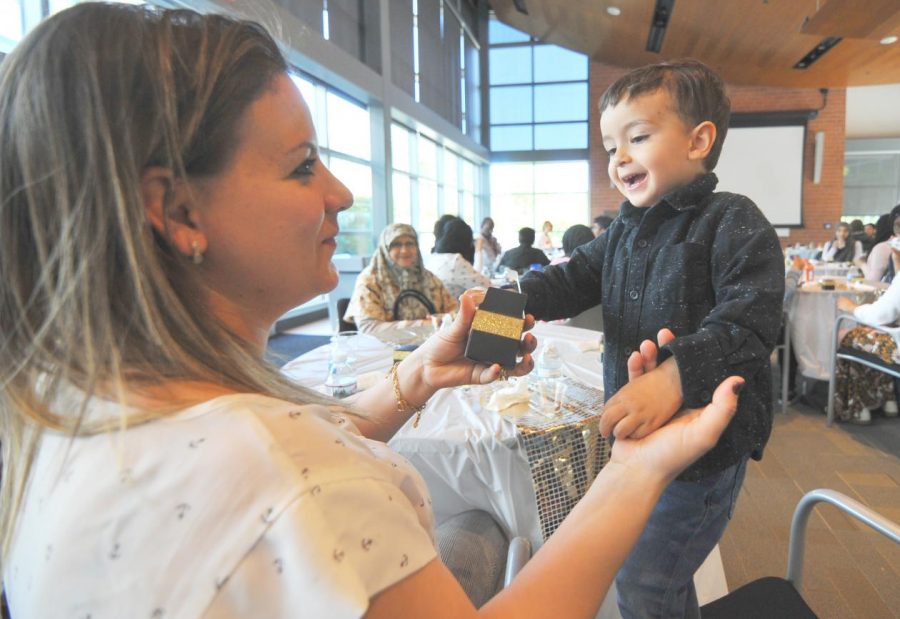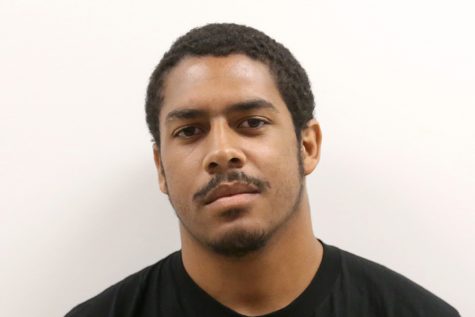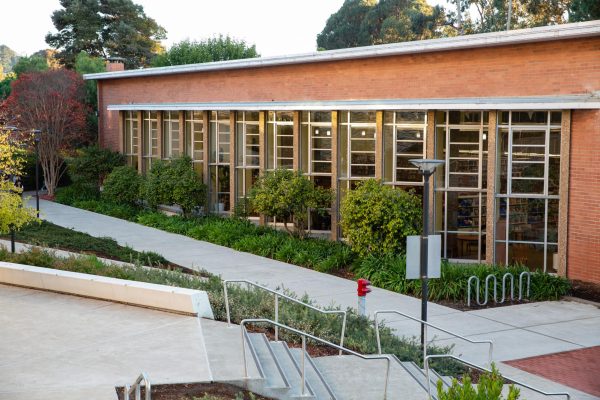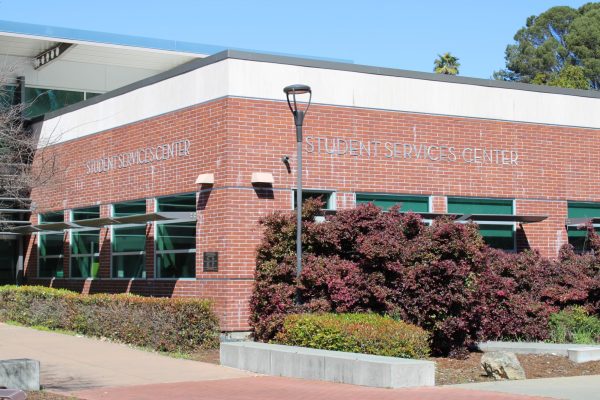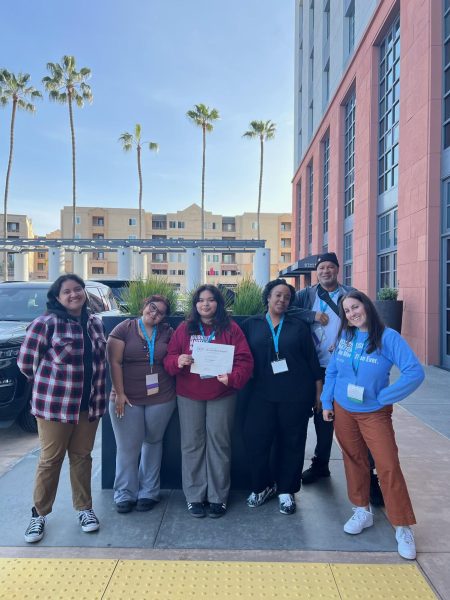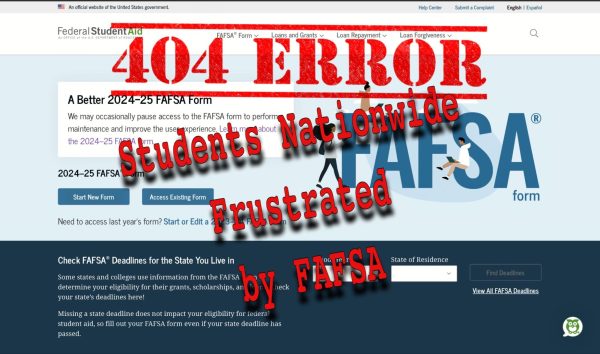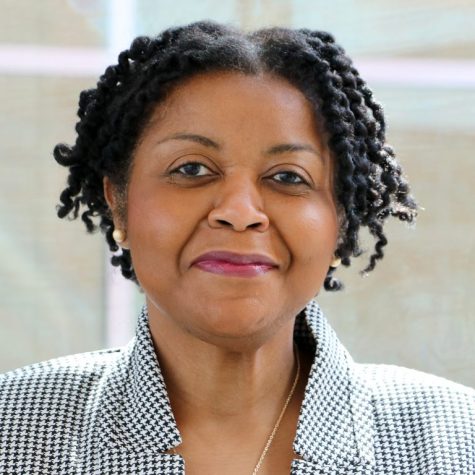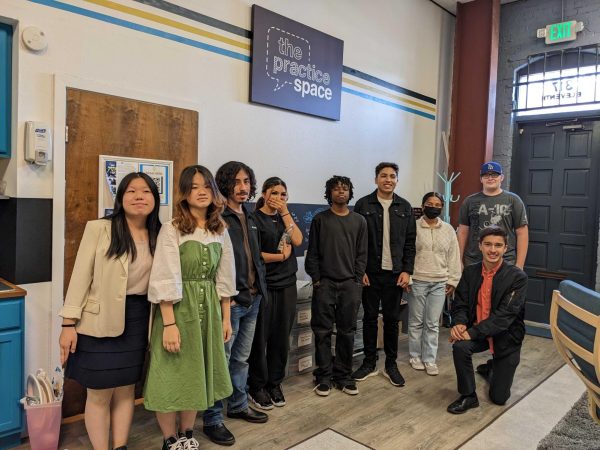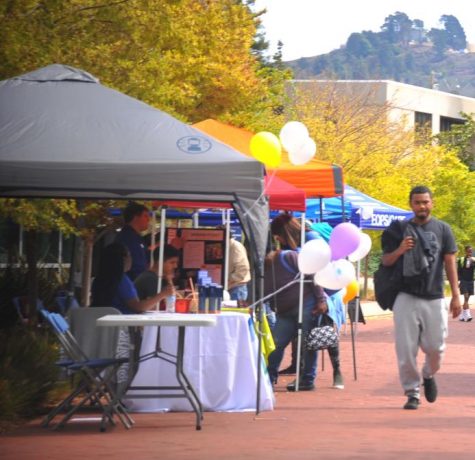Fasting unites in Fireside
ESL major Challal Kahina (left) gives her son, Massinass Kahina (right), a Mecca candy box during the annual Muslim Student Association Fast-a-thon event in Fireside Hall on Monday.
May 1, 2019
In an effort to create a greater sense of community and share culture, the Muslim Student Association’s (MSA) third annual Fast-a-thon gave Muslims and non-Muslims the opportunity to reflect and learn about the upcoming holy month of Ramadan.
Ramadan is a yearly observed Muslim holy month of fasting, increased charity and community bonding and is observed by Muslims around the world as the ninth month of the Islamic calendar.
At Contra Costa College, the Fast-a-thon was held Monday in Fireside Hall. Tickets were $3 and afforded attendees a meal and entry into a raffle for Target gift cards.
MSA President Hasna Alawdi said early returns show they raised about $250. All proceeds this year are being donated to Symbols of Hope for Yemen.
Attendees were encouraged to do a truncated fast, then to break their fast during the feast.
MSA member Mohammed Alammari said taking part in the fast, even just for the day, is a personal journey that will change an individual and put life into perspective. It encourages people to be happy with what they already have.
“People are ignorant to our faith and will ask ‘why do you starve yourself,’ but with fasting we are putting ourselves down to see our plate. Everyone says they’re blessed, but during Ramadan, we want to feel our blessings,” Alammari said.
This year Ramadan starts the morning of May 5 (Sunday) and ends the evening of June 4. It is observed every day from sunrise to sunset, which can last up to 16 hours.
The fast requires refraining from eating or drinking, even a sip of water, while also avoiding negative interactions like gossip and lying.
For students who attempted their own fast prior to the event, participation ended up being difficult and definitely a time for self-reflection.
“You’re so used to having food at your fingertips — most people aren’t so fortunate. It makes you mindful of what you’re eating and how you feel without food,” Black Student Union member Tiya Gordon said.
MSAs around the nation also have fast-a-thons as a way to help students understand more about Ramadan and Islam.
“Fast-a-thon is an outreach program to unite a little before Ramadan and build bridges between the Muslim and non-Muslim communities, to try and understand each other’s culture. We’d like to help people have more tolerance. People just don’t know or take the time to learn about Islam,” guest speaker Imam Hamza Mehter said.
The feast represents the evening breaking of fast which often is a communal moment with family and loved ones at a local mosque.
Community member Kahina Challal said Ramadan is a time the family and community all come together, even if they don’t meet much the rest of the year.
Alammari said, “During Ramadan, I get way closer with family and God and my community. It’s a beautiful month. Ramadan refreshes you.”
As guests filled their plates with this year’s feast including chicken tikka masala and rice, Mehter, who’s back for his second year, shared background on Ramadan and went over the main objectives during the holy month.
Ramadan translates to “to burn,” and Mehter said Ramadan is a time to burn one’s sins.
Mehter said during Ramadan the objectives are to become God-conscious, which includes increased prayer and time for reflection and to be grateful.
He emphasized the increased sense of self-reflection and prayer, community and charity that happens during Ramadan.
“There is such an emphasis placed on community, building bridges with others, generosity and giving of our time, wealth and resources to help others,” Mehter said.
As Mehter’s talk closed, he reiterated the importance of giving during Ramadan, which Alawdii said she wanted to be emphasized during the evening’s dinner.
“The charitable part of Ramadan is what a lot of people don’t know about.
“It’s a big part of the month. It’s a time when we can reflect on what we have and think of the poor,” she said.
As the event closed, guests were asked a few questions about what they know about Islam. Throughout the evening food, conversation and knowledge were shared building a bridge toward understanding just what Ramadan is and why it’s meaningful.
“Events like this are important in the time that we are living in, building bridges and doing something a little extra,” Alawdii said.
It includes having student responsibilities and still having the forbearance to be patient with people and going out of your way to do extra.
“These events work to build community,” Mehter said.
According to Intensive Dietary Management, fasting has been practiced for centuries and is one of the oldest traditions of millions of people of different faiths around the world.


